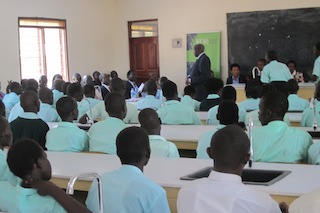Jonglei anticipates improved performances in 2015 exams
November 27, 2015 (KAMPALA) – The secondary schools examinations secretariat in South Sudan’s Jonglei state said it was prepared to challenge the rest of the country’s states in the forthcoming examinations soon to be undertaken by senior four students.

Over 206 students did mock exams concluded on 27 November. The average score per subject and overall averages for the recommended 13 subjects will be considered for quick adjustment by the teaching staff.
“Jonglei students in South Sudan were affect by the December 2013 crisis, which made them not performed very well last year. That was why we came up and organized this mock in Jonglei state for the first time for senior four candidates to sit”, said Magok.
“Mock exams are made to pull-up and encourage students to compete in order for them to pass the final examinations”, he added.
Although few girls were likely to make it in this year’s final exams, girls’ enrolment is said to have increase tremendously in primary and secondary schools, due to the introduction of girl support fund granted by government through Food For Hunger in Jonglei state.
Each girl in primary and secondary school received between SSP125 to SSP300 every term, which they used to address issues their parents would not easily be able to afford.
A number of girls have, however, shown commitments to excel at both levels in the state.
Most schools in villages deserted by the residents due to fear of attacks were closed. As a result, majority of school children fled with their parents to areas with no schools.
Since then, no plans have been made by state education officials to address their plight.
(ST)
